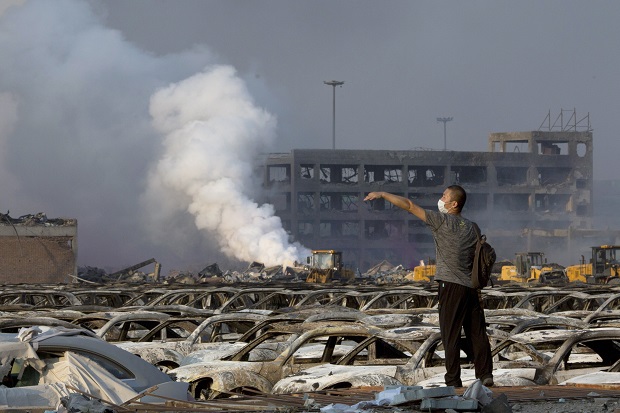Firefighter rescued from blast zone in China’s Tianjin port

In this photo taken Thursday, Aug. 13, 2015, a man walks through the site of an explosion at a warehouse in northeastern China’s Tianjin municipality. Rescuers have pulled a survivor from an industrial zone about 32 hours after it was devastated by huge blasts in China’s Tianjin port. Meanwhile, authorities are moving gingerly forward in dealing with a fire still smoldering amid potentially dangerous chemicals. (Photo by Ng Han Guan/AP )
TIANJIN, China — Rescuers Friday pulled out a firefighter who was trapped for 32 hours after responding to two huge explosions in Tianjin, state media said, as authorities moved forward gingerly in dealing with a fire still smoldering amid potentially dangerous chemicals.
The two explosions late Wednesday at the Chinese port city— one of them the equivalent of 21 tons of TNT — killed at least 50 people and injured more than 700. The blasts originated at shipping containers owned by a logistics company authorized to handle hazardous material and struck a mostly nonresidential warehouse district.
The death toll included 17 firefighters sent in after the first blast, and would have been much higher in a more populated area. Other firefighters also went missing while responding to the blasts, though authorities have not clarified how many.
One firefighter was pulled from the zone at about dawn Friday and brought to a hospital, where he was being treated for face, chest and feet injuries, the state broadcaster CCTV reported.
“Forces from all sides are searching for the (remaining) missing firefighters,” Tianjin Fire Department head Zhou Tian said at a news conference early Friday.
The logistics company, Ruihai International Logistics, handled chemicals ranging from flammable gases and liquids including compressed natural gas and ethyl acetate to toxic chemicals like sodium cyanide and toluene diisocyanate.
However, the warehouse was a transit point and authorities do not have a clear picture of what was there at the time of the blasts. Records at the site were destroyed in the disaster, said Gao Huiyou, deputy director of occupational safety in Tianjin.
Zhou said further firefighting efforts most go slow because of the potentially complex mix of chemicals at the site
“Many types of different materials with different characteristics are mixed together and could at any time result in a chemical reaction or explosion,” Zhou said.
RELATED VIDEO